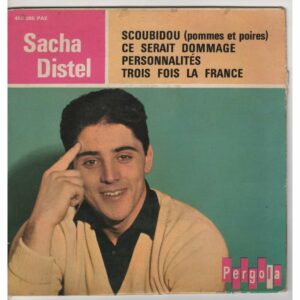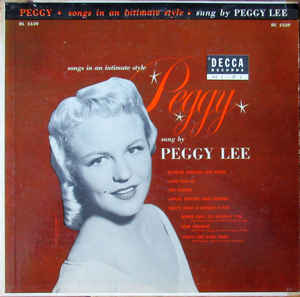Pour ce huitième numéro, nous allons évoquer une chanson qui parle de fruits mais pas seulement.
You can find a summary in English below.
La pochette du 45T de Sacha Distel :

La pochette de la version originale de Josh White :

Et la version de Peggy Lee :

For my Friends who don’t speak French a summary in English. I hope it can help to follow what I say :
For this 8-th episode, we will discuss about fruit and more…
- Sample of the French cover
Scoubidou or Scoubidou (des pommes… des poires…) is the song that launched Sacha Distel’s career in 1959 as a variety artist. Sacha Distel, nephew of Ray Ventura, was until then known as a good jazz guitarist (and a seducer too but that does not concern us even if it has a link with the previous episode – Bardot and Distel have had an affair together).
Dalida will then create an Italian version of the song, and even later a Germanic version under the title Äpfel une Birnen.
Years later, the song fascinated Christian Clavier alias Jacquouille in the movie Les Visiteurs 2.
But let’s listen to a sample of the version that inspired Distel’s version.
- Sample of Peggy Lee‘s version
In 1953 Apples, Peaches and Cherries is a rather jazz hit by Peggy Lee which starts with a jazzman scat « shoo-bee-doo-be-doo ». The transformation into « Scoubidou » in the version of Distel will give its name to the French version and then finally to the plastic object made of multicolored braided threads!
But contrary to what you could often read Peggy Lee’s version is not the original version!
- Sample of the original version by Josh White
The singer of the original version is Josh White, an American guitarist and blues singer. Known mainly by specialists in France, he is a huge figure in black American music, quoted as a reference by Woody Guthrie, Harry Belafonte, Bob Dylan…
The French text is not an adaptation of the American text which speaks of the sixteen-year-old daughter of a peddler who passes by with his cart full of apples, pears and cherries.
The author is poet Lewis Allan (real name Abel Meeropol) who is also the composer of « Strange Fruit » iconic anti-racism song, sung by Billie Holiday.
